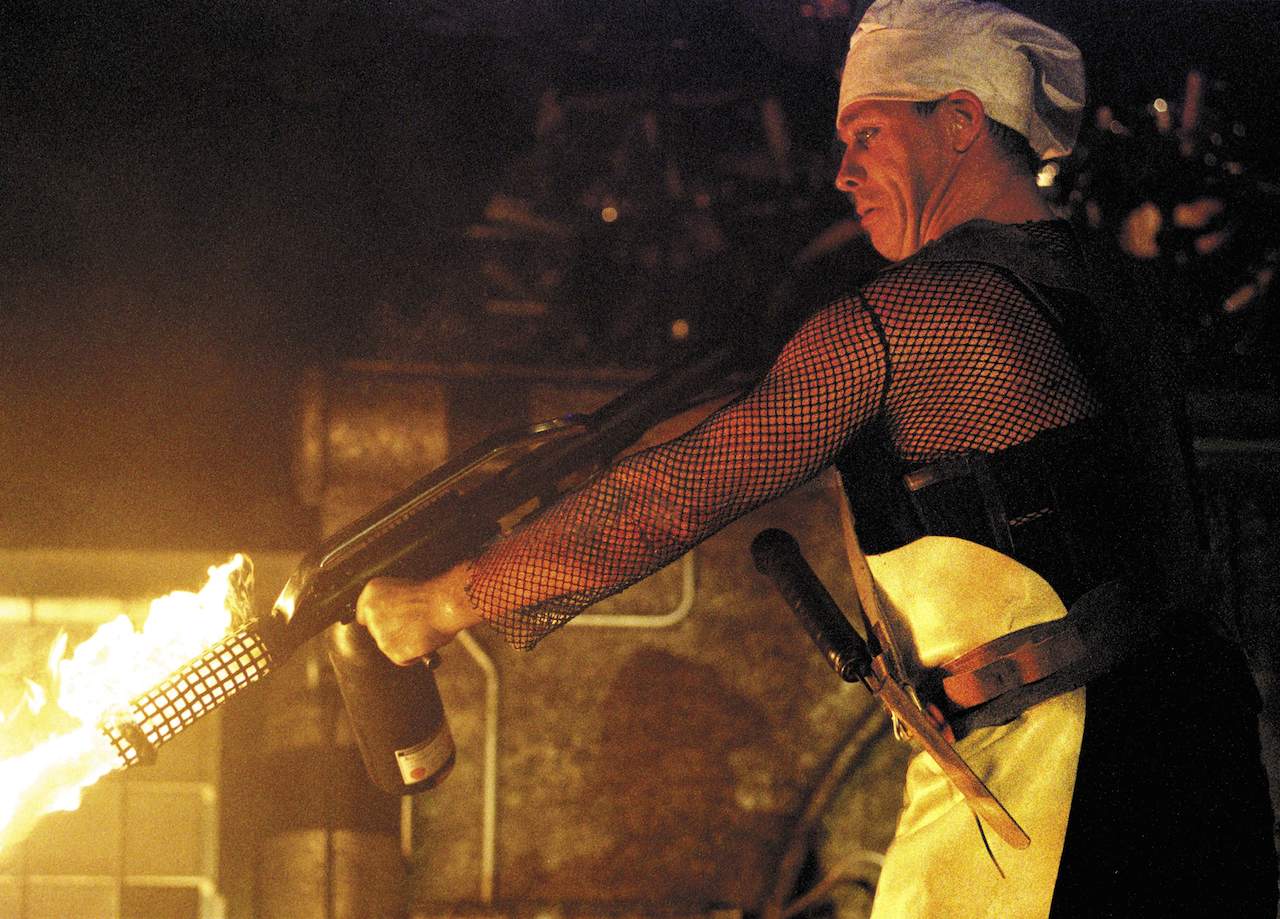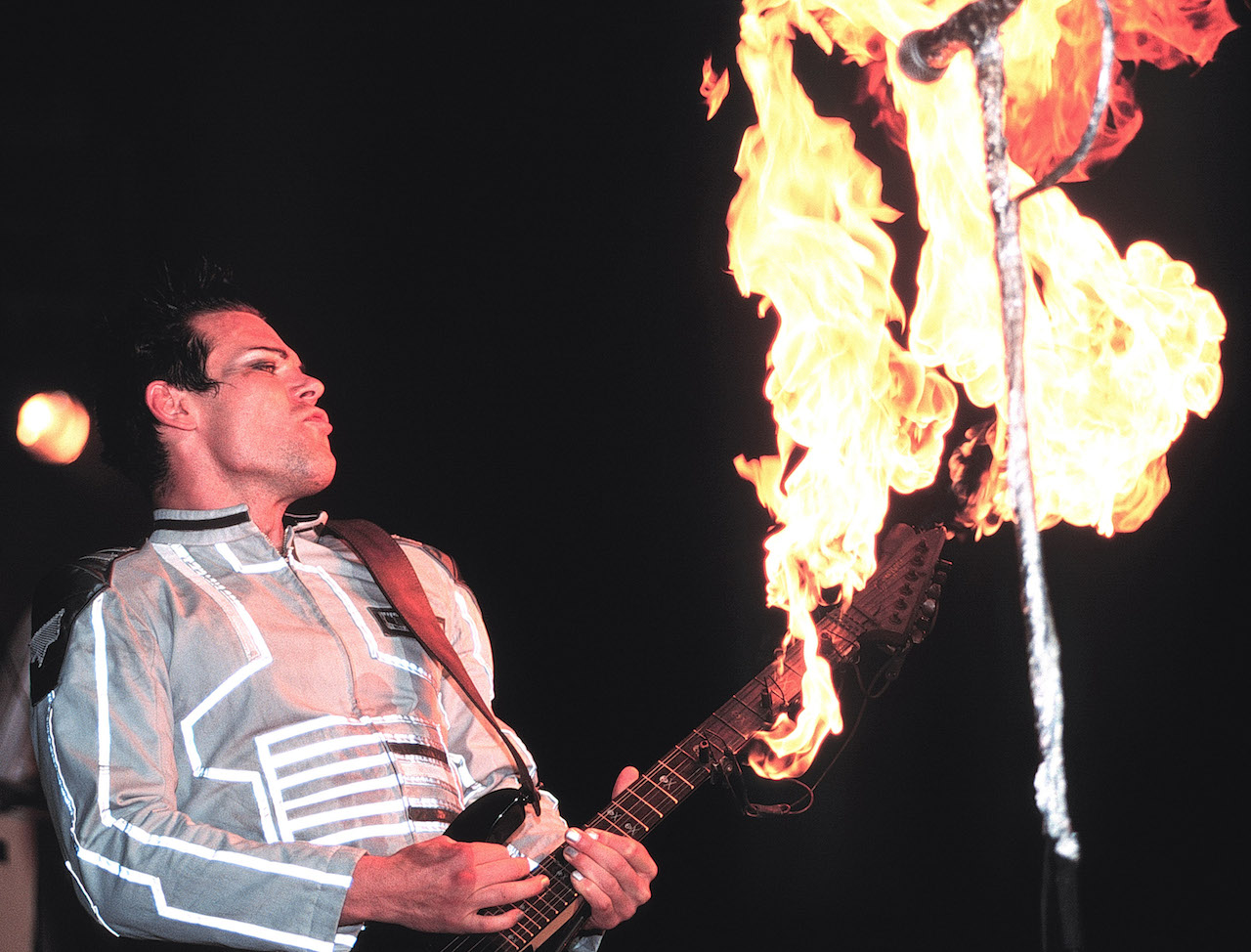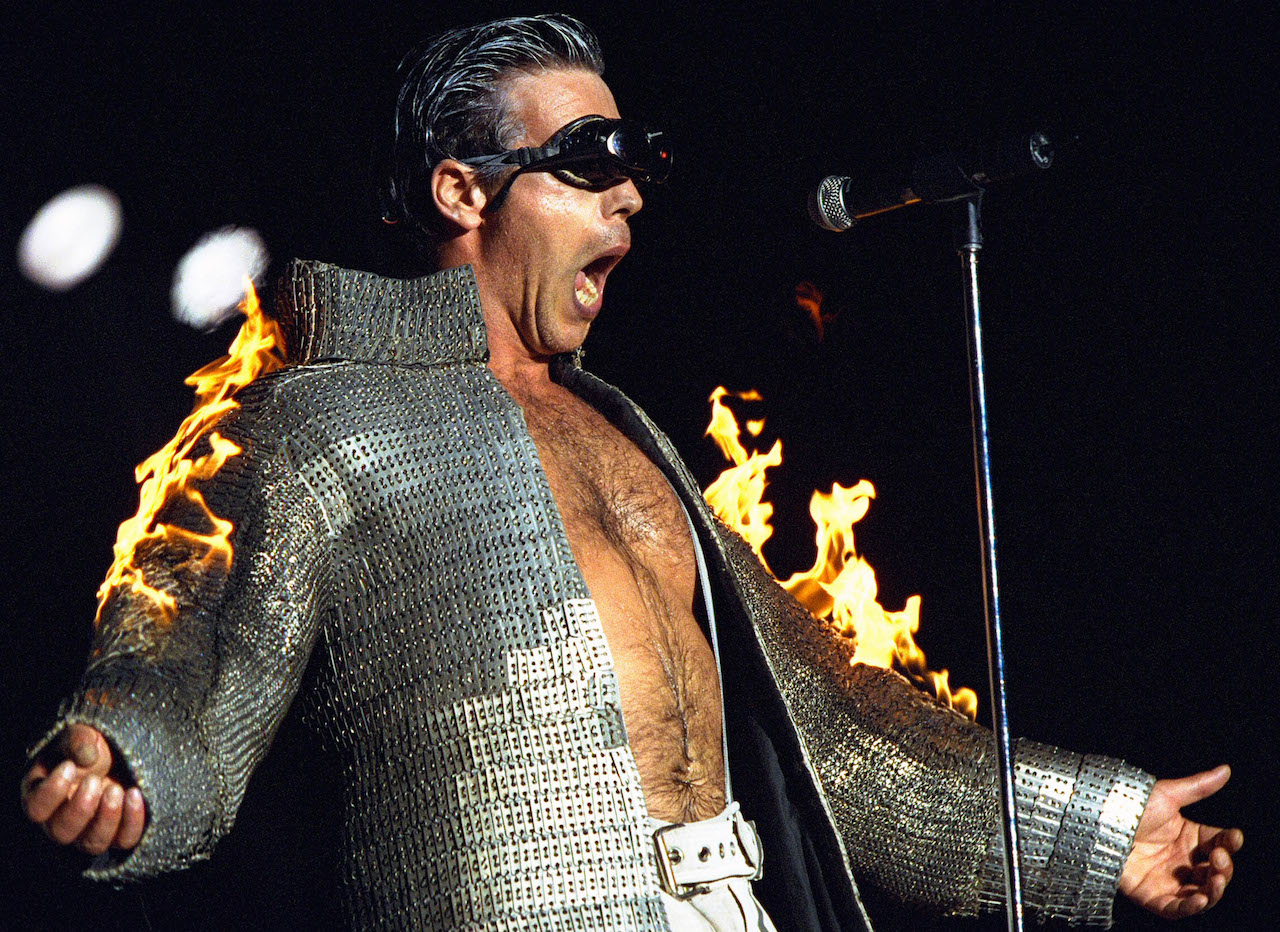It seemed crazy at the time. Rammstein were a band from Germany – from the former East Germany, no less – who were arrogant/stupid enough to think they could make a career out of singing songs in German. Not meaning to be funny, but were they taking the piss?
Clearly, history has proved that they had the right idea. Rammstein have faced so much prejudice in the 22 years since they first emerged on the scene, but it has had about as much impact as a lettuce leaf slapping a giraffe. Theirs really is a remarkable achievement.
The band – vocalist Till Lindemann, guitarists Richard Z Kruspe and Paul Landers, bassist Oliver Riedel, keyboard player Christian Lorenz and drummer Cristoph Schneider – got together in 1993. Despite all coming from the former East Germany – specifically East Berlin and Schwerin – they got their name from a town in West Germany called Ramstein. In August 1988, 67 people were killed on the US airbase there, when three planes involved in an aerobatics display collided in mid-air.
It was Kruspe who proved to be the driving force behind Rammstein (the extra ‘m’ in the name makes it a literal translation of ‘battering ram’). Having failed to get the heavily American-influenced Orgasmic Death Gimmicks off the ground, he decided to stick to his German roots, getting in Lindemann (who’d been the drummer with First Arsch, and was a basket weaver by trade) to sing. Slowly the line-up took shape.
They recorded a batch of demos in Berlin – these have subsequently been released as the Herzeleid Demos 93-94 collection – before finally getting the chance to record their debut album, Herzeleid, a year later. And this is where our story takes off…

“The title Herzeleid is an old German word for heartbroken,” says Richard Z Kruspe. “To understand what we went through to make the album, you have to appreciate what was going on in our lives at the time.
“I was breaking up with my girlfriend, and it was very tough. I’d never experienced anything so emotionally hard before. It left me drained. Unless you’ve been through something similar, then you can’t get to grips with the way I felt.
“Till was going through something similar, and as he was a good friend I stayed with him for a few months. I suppose we helped each other out. In fact, the rest of what was to become Rammstein were also suffering personal problems of their own. So the title of the record really said it all about our states of mind.”
The six members of Rammstein poured their anger and frustration into the music, determined to make it a cathartic experience. Their first demo was recorded at Kruspe’s tiny flat, under almost impossible conditions. But this process was to prove vital.
“We entered the tape in a local competition, and won a week’s studio time. We used that to get a better quality demo done, which included an early version of Rammstein and Weißes Fleisch [both of which turned up on the first album]. Our aim from this was to get both a manager and a record deal.”
With the former in mind, the band started to hassle one Emanuel Fialik, their first choice for the management job. But, initially he wasn’t interested.
“He saw us live, and didn’t get what we were about. However, we got a lucky break when a gig the band were supposed to do out of town was cancelled at the last minute. We went back to Berlin and nagged a local club we knew to put us on; we didn’t care where we were on the bill – all we wanted to do was play. We persuaded Emanuel to come down again, and this time he was impressed enough to say that he’d do the job!”
With a manager now in place, Rammstein then set about getting a label deal. Again, it would have been easier to make a noise in a vacuum…
“Nobody wanted to know! But then we got a lucky break with Motor Music, and finally we were away.”
So, they expected things to take a turn for the better. Unfortunately, though, this is where the going got tougher.
“Right, our first job was to get a producer. What did we know about production? We thought the best way of getting together a short list was to look at who produced some of our favourite bands. Logical? We thought so, but our first choice was so wrong.”
The man they went for was Greg Hunter, who’d collaborated with Killing Joke. But he wasn’t what they expected.
“His name was there. He’d worked in a production capacity with a great band. So, Greg came out to Berlin to watch us rehearse. He was a really nice guy, very friendly. But then we took him down to a rehearsal studio, and he sat on a couch while we ran through the songs for the album.
“Anyway we got through several, and he’d made no comment at all. That worried us. Now, the way things were set up, Greg wasn’t actually in our eye line. So we made a point of looking up at him after the next song – and he was asleep. Snoring! Great. I think at that point all of us realised that he wasn’t the man for the project.”
Their next choice proved rather more successful: Jacob Hellner, who’d worked with Sweden’s Clawfinger.
“We liked the technology they’d used on their albums, so we met up with Jacob, and he was much more in tune with what we were after. But he wanted to work in Sweden, and that proved to be another problem. He also had an assistant, Carl-Michael Herlöffsson, who ended up doing very little in the studio. But that’s another part of the story.”
- My Life Story | Ministry's Al Jourgensen
- The A-Z of Rammstein
- Nine Situations When Only Rammstein's Music Will Do
- Rammstein: "They Drank And Flagellated Themselves, The Blood's Real."
Initially, the band worked at Polar Studios in Stockholm, which was built by Abba. But they were only there for a week (“In that time, we did the drum tracks,” recalls the guitarist), before moving to Hellner’s own studio, which again wasn’t exactly a change for the better.
“It was so hard for me to get the right guitar sound in there. The place was cramped, and very different to where I’d been used to rehearsing. It was a real change, and one I didn’t appreciate. We also had a problem being in Stockholm. You see, the way Jacob worked was almost office hours. So we’d be left on our own during the evenings and at weekends. We didn’t speak Swedish, or that much English, and felt very alienated. We couldn’t go anywhere, nor do anything. So, our mood wasn’t the best.”
There was yet another situation that the band had to face.
“When Jacob started to work with Till on the vocals, we soon realised that his German wasn’t up to the job. And, as the lyrics were all in our language, things got very confused. Can you imagine a Swedish producer working with German songs, when he doesn’t actually understand what we were on about? That was very, very frustrating!”
As everyone will doubtless realise by now, sticking sharp blades in your abdomen would have been more fun than being in Rammstein at this juncture. Misery was definitely a constant companion – and it was about to cosy up even more intimately.
“So, we’d been working on the album for three months, when it came to the mixing stage. Now, we let Jacob do it. Why not? It made sense. He’d recorded the thing… but it was a major error on our part. I was really the only one from the band there when we started the mixing stage. And I soon understood that Jacob didn’t know what he was doing. We began arguing, things weren’t getting done, and I wasn’t happy. What could I do?
“Eventually, there was only one thing left. I called everyone together in Stockholm for a conference – Jacob, the band, the management and the label. We had to sort it out. Carl-Michael was, by this time, out of the picture. He was having his own personal problems, and hardly did anything on the record anyway. We decided that someone else had to come in for the mix, and that’s when we came across Ronald Prent. He was Dutch, although we did all the work in Hamburg. I have to say that Ronald wasn’t easy to work with, and we did have some disagreements, but he really saved the album. I dread to think what might have happened without him!”

The Herzeleid record was finally released in September 1995, quickly making an impact on the German charts, clawing up to No.8. But there was still one more obstacle to overcome after it crawled into the shops.
“The bloody sleeve! What a crazy situation that was. We approved the photos in a car park without thinking what we were letting ourselves in for. When we saw what the designer had done, we freaked! We looked so… gay! All of us stripped to the waist. It was like an ad for a gay porno film. So we had to say, sort it out. Make us look straight again. Change the sleeve.”
Inevitably, the guitarist doesn’t exactly look back fondly on the album. In fact, to some extent he’d like to quietly chain the memories to a stake in a dark cellar, lock the door and throw away the key.
“I don’t listen back to the record now at all. No. And I don’t think it’s one of our best albums – not even close. It was a very painful time for all of us. Imagine going through all the personal shit we’d had, and then having a hard time getting the music out. They do say what doesn’t kill you makes you stronger, and in a way I am glad to have gone through so much. When you face up to the sort of crises that I was having in my personal life – which led to me starting Rammstein in the first place – then you learn lessons from these, you admit where you’ve gone wrong, and you try to put things right. So, I have to say there were some good reasons to be grateful to Herzeleid.
“Actually, the process of making every Rammstein album is very hard. When you have six people, all of whom have strong opinions, then nothing is easy to resolve. And you have to compromise a little to make progress. But I appreciate this is better than working alone. It’s good to be in a band, to have a good sense of togetherness and a shared sense of achievement. The pressure isn’t so intense, and other people’s input can be vital.”

In the end, Rammstein have overcome all the early difficulties to achieve major international success. They’re now the biggest selling German language band ever on the international scene. To date, the Ramms have sold over 10 million albums.
Much of this has been due not only their incredibly catchy, self-styled ‘tanz metal’ songs, but also thanks to a ridiculous live show, which is so OTT it makes Kiss seem like an end-of-season puppet show on Blackpool’s South Pier.
Their motto has long been: other bands play, Rammstein burns, with a show so packed with pyros that fans have been carried out suffering from heat exhaustion. Add to this Grammy nominations and appearances in Hollywood films (they pop up at the start of the thriller xXx), and it’s clear that those seemingly impossible beginnings are what spurred them on.
Despite shudders from Kruspe as he recalls the dark, dense days of Herzeleid, he concludes on a positive note.
“How would I sum up that period in our lives? We had to go through it to get to where we are today.”

